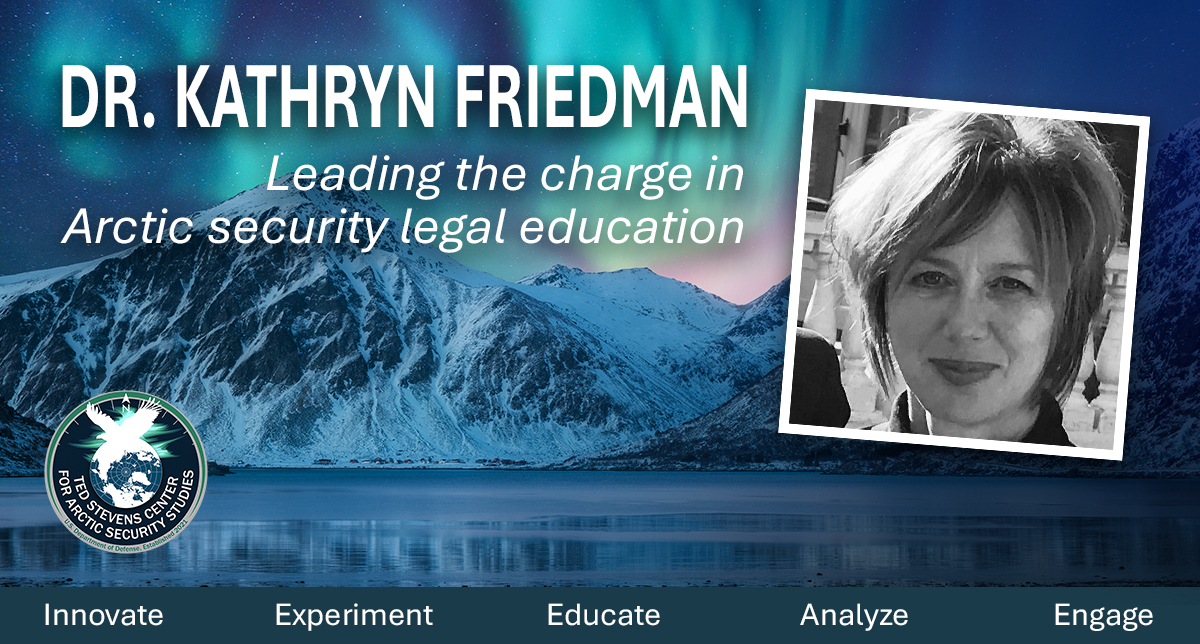
JOINT BASE ELMENDORF-RICHARDSON, Alaska — In the realm of Arctic security studies, Dr. Kathryn Friedman stands as a guiding force, leading initiatives to enhance understanding and cooperation in this critical domain.
As the North American Arctic Policy Advisor at the Ted Stevens Center for Arctic Security Studies, Friedman’s expertise and leadership have been instrumental in the development and success of the Arctic Multidomain Legal Course, a flagship program under the School of Arctic Security Studies.
Friedman’s journey into directing the AMLC was serendipitous, evolving from her original role within the Research and Analysis Division at TSC.
Reflecting on her transition to directing the course, Friedman explained, “I came on board in August of 2022. At the time I was the only person at the center with a law degree. Prior to coming to the center, I was a Research Associate Professor of Law at the University of Buffalo, so I had taught law courses in the past.”
It wasn’t long after her arrival that Matthew Bell, the Dean of SACSS, approached Friedman to help develop a legal course. “Matt Bell said, ‘I think we should have a legal course, create one.’ So, I said, ‘okay,'” Friedman reminisced.
Her legal and educational background equipped her with the necessary skills to make her an ideal candidate for the role of Course Director. With the help of the SACSS team Friedman set to work to launch the first AMLC in December 2022.
“The first course strictly focused on the maritime domain since the Arctic region is primarily a maritime environment. So, the content and material focused on the various legal instruments that are relevant like the United Nations Convention on the Law of the Sea, the Arctic Council, the Polar Code, etc.”
Over time, the AMLC has evolved to meet the growing demand and address multifaceted challenges in the Arctic. The course expanded to encompass air, land, cyber, and space domains, providing participants with a holistic understanding of legal frameworks relevant to Arctic operations.
Embracing the ever changing geophysical and geopolitical aspects of the Arctic region Friedman emphasized the course’s adaptability.
“We switch the course modules around depending on demand, and depending on what we think participants might want to learn about or depending on current events. For example, last year, when the Chinese high-altitude balloons were shot down, we decided to have a panel on high-altitude balloons and the risks in the Arctic,” explained Friedman.
Not only has the AMLC’s content evolved over time but after the August 2023 course Friedman explained that, “Dean Bell wanted the course to incorporate an argumentative style approach that you would see in a moot court.” To accomplish this Friedman worked with the school’s adult education experts to develop a scaffolding exercise that embeds participants in the exercise on day one.
Using this new format, the recent iteration of the AMLC, held from Jan. 30 to Feb. 1, saw 83 graduates from six different countries: Brazil, Canada, Denmark, Hungary, Iceland and the U.S., underscoring the course’s global impact. Friedman highlighted the course’s unique features, including a simulated session before the U.N. Security Council, which received praise from participants for its educational value and immersive experience.
Looking ahead, Friedman envisions further expansion and innovation for the AMLC. She expressed a desire to include content tailored to European Allies and partners, aiming to broaden participation and address shared concerns.
Additionally, discussions are underway to introduce asynchronous online versions and executive-level courses to cater to diverse needs and audiences.
“The law is an important lens through which to view our challenges and opportunities,” explained Friedman. “All Arctic professionals should have some basic knowledge on the legal landscape in the Arctic.”
As Course Director Friedman extended her gratitude to the dedicated team behind the AMLC’s success, including Dwayne Wood, Dieter Bareihs, Beth Copes, Jason Roe, Matthew Wee, Connor Keesecker, Bryan Schroder and Christine Duprow. Their collective efforts, alongside Dean Matthew Bell’s vision, have been pivotal in realizing the course’s objectives and advancing Arctic security cooperation.
Friedman reiterated her commitment to excellence in Arctic security education, stating, “It’s a privilege to work with this team and to work on this course for the Ted Stevens Center.” With her leadership, the AMLC continues to serve as a cornerstone in fostering collaboration and expertise in the rapidly evolving Arctic landscape.
The next AMLC is scheduled for May 7-9, 2024, offering an invaluable opportunity for defense professionals to deepen their understanding of Arctic legal dynamics. Interested individuals are encouraged to visit the Ted Stevens Center website for more information and registration: https://tedstevensarcticcenter.org/
In the realm of Arctic security studies, Dr. Kathryn Friedman stands as a guiding force, leading initiatives to enhance understanding and cooperation in this critical domain. As the North American Arctic Policy Advisor at the Ted Stevens Center for Arctic Security Studies, Friedman’s expertise and leadership have been instrumental in the development and success of the Arctic Multidomain Legal Course, a flagship program under the School of Arctic Security Studies. (DoD Graphic by Amber E. N. Kurka
